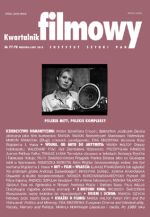(Bez)sens życia we wczesnych filmach Wojciecha Jerzego Hasa
The Meaning of Life in the Early Films of Wojciech Jerzy Has
Author(s): Ewa MazierskaSubject(s): Theatre, Dance, Performing Arts
Published by: Instytut Sztuki Polskiej Akademii Nauk
Keywords: Has; J. Wojciech; Pętla; Loop; Wspólny pokój; A Shared Room; Złoto; Skolimowski; Jerzy; Polish cinema; history of film
Summary/Abstract: The paper argues that the early films of Wojciech J. Has, namely "Pętla" ("Loop", 1957), "Wspólny pokój" ("A Shared Room", 1959) and "Złoto" ("Gold", 1961), convey the idea or a sensation that life has no ultimate or deeper meaning. However, one can also identify a certain trajectory in Has’s films:" Loop" is the most pessimistic of Has’s films; in "Gold" the author is closer to affirming life, although the film still comes across as rather pessimistic. Mazierska tries to identify reasons for the pessimism of Has’s films by emphasising the link between Has’s characters and those populating existential works, which were very influential at the time Has made his films. The author of the paper also points to their transformation, marked by gradual diminishing of their existential aspect; this being replaced by socialist realism. She also argues that the transformation in Has’s early cinema can be seen in terms of the shift from tragedy to melodrama. The essay is also informed by a discussion of Has’s approach to gender and comparison of his films to those made by Jerzy Skolimowski at a similar time.
Journal: Kwartalnik Filmowy
- Issue Year: 2012
- Issue No: 77-78
- Page Range: 95-110
- Page Count: 16
- Language: Polish

